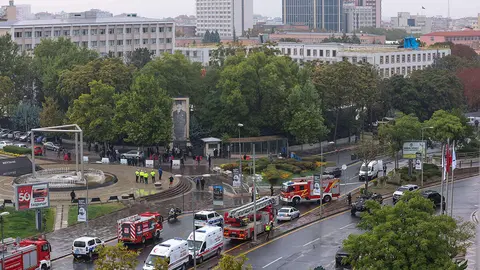Attack on military academy in Syria leaves more than 110 dead

Syria is once again on the front pages of the international media. Despite the fact that the conflict has recently decreased in intensity compared to the first years, the violence in the country has not ceased after more than a decade of civil war.
Syrian opposition media sharing this video claiming to be from inside the Military College in Homs moments after the drone attack. According to @syriahr, the death toll has risen to more than 60, among them 9 civilians, and over 120 people injured, dozens in critical condition. pic.twitter.com/t34Y6GIoWl
— Ariel Oseran (@ariel_oseran) October 5, 2023
More than 110 people, including military personnel and civilians, have been killed in a drone attack on a military academy in the government-controlled central province of Homs. The attack took place during a graduation ceremony attended by Syrian Defence Minister Ali Mahmoud Abbas, who left the scene shortly before the attack.

The UK-based Syrian Observatory for Human Rights reported "112 dead, including 21 civilians, 11 of them women and girls" and at least 120 wounded. Health Minister Hassan Al-Ghobash told state television that the "preliminary" figure was 80 dead "including six women and six children" and around 240 wounded.
📸 Funeral ceremony held in areas under Assad regime control
— Mete Sohtaoğlu (@metesohtaoglu) October 6, 2023
for the 123 soldiers killed in Homs, Syria pic.twitter.com/bf0uZbAVlC
According to a Syrian army statement, the attack was carried out by insurgents "backed by known international forces", who used "explosive-laden drones". In the statement, Syrian military authorities also vowed to "respond firmly" to the attack, one of the worst to hit the area controlled by President Bashar al-Assad since the war began in 2011.
#BREAKING – #Syria: Pro-regime media say that the air defense targeted a number of drones that tried to reach #Homs Military Hospital pic.twitter.com/xeoNmqpXOd
— Congratent Intel (@Congratent) October 6, 2023
The Syrian army's promises have been kept. Shortly after the attack on the military academy, government forces shelled the rebel-held region of Idlib. According to the Syrian Observatory for Human Rights, eight people were killed and about 30 wounded. Parts of this province are controlled by Hayat Tahrir Al-Sham, a terrorist group led by the former al-Qaeda branch in Syria. The jihadist organisation has used drones to attack government-controlled areas in the past.
[ 🇸🇾 SYRIE ]
— (Little) Think Tank (@L_ThinkTank) October 5, 2023
🔸Bombardements à l’aveugle ce soir sur la province d’Idlib en réponse à l’attaque contre l’académie militaire d’Homs. Déjà 35 civils tués et blessés dans les bombardements. https://t.co/q9hLoIUTvY pic.twitter.com/J598tQdZoV
UN Secretary-General Antonio Guterres has expressed "deep concern" about the Syrian army's retaliatory attacks and bombings, while Geir Pedersen, the UN special envoy for Syria, stressed the need for "an immediate reduction of violence, a nationwide ceasefire and a cooperative approach to counter terrorist groups".
Video shows ongoing Turkish strikes in northeast Syria, spreading fear among civilians. pic.twitter.com/GWhqOJFeIG
— Wladimir van Wilgenburg (@vvanwilgenburg) October 5, 2023
The bombing of the military academy and the retaliatory shelling of Idlib coincides with a Turkish campaign against Kurdish forces in northern Syria. After bombing Iraqi Kurdistan following an explosion outside the interior ministry in Ankara last Sunday, Turkish forces have carried out air strikes in northern Syria, destroying 30 targets, including "shelters, depots and storage sites", according to a defence ministry statement.
Turkey's targets in Syria are the Kurdish People's Protection Units (YPG), a Kurdish organisation that Ankara links to the Kurdistan Workers' Party (PKK), which is listed as a terrorist group by Ankara and its Western allies. The YPG is part of the US-backed Syrian Democratic Forces (SDF). The SDF also played a key role in the victory over Daesh in 2019.
Turkish UCAV strikes continue to hit oil & gas facilities of terrorist organization PKK/YPG in eastern Syria. pic.twitter.com/AGWpnsUHTw
— Clash Report (@clashreport) October 6, 2023
Turkish strikes against Kurdish positions in northern Syria are likely to increase as Ankara warned that it would step up its operations in the area after concluding that the terrorists who carried out the recent attack in the Turkish capital originated from Syria. Between 2016 and 2019, the Turkish military conducted three major operations in northern Syria against Kurdish forces.
#Syria, Oct 5, 2023:
— Charles Lister (@Charles_Lister) October 5, 2023
- 60+ killed in suicide drone attack on #Homs Military College.
- 25+ localities shelled by #Assad forces in #Idlib, many casualties.
- 30+ #Turkey airstrikes on #SDF & civilian infrastructure in NE.
- Possible U.S shoot-down of #Turkey drone, over #Hasakeh.
The latest bombings have killed 11 people, including five civilians and six security personnel, according to Kurdish sources. Similarly, during this latest campaign launched by Ankara, US F-16 fighter jets have shot down a Turkish drone, deeming it "a potential threat" after it came "within half a kilometre of US forces" near Hasakah.
NEW: A U.S. jet fighter shot down a Turkish drone in Syria after it was deemed a threat to U.S. forces in northeast Syria, a person familiar with the episode told WSJ
— Ragıp Soylu (@ragipsoylu) October 5, 2023
• A US official said they were aware that it was a Turkish drone pic.twitter.com/FNnRxCuCr3
The US and Turkey, despite both being NATO members and allies on some issues, have pursued different strategies in Syria since the beginning of the conflict. While both entered Syria with the common goal of overthrowing the al-Assad government, Ankara and Washington soon after began to pursue their own interests. While for the US the elimination of jihadist groups - with the help of the Kurds - is the primary issue, Turkey's main goal is to fight the YPG forces.









